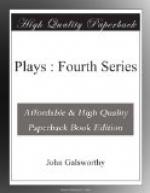Jim. Yu threw un out of winder. I cud ’ave, once, I cud.
[Strangway neither
moves nor speaks; and Jim Bere goes on with
his unimaginably slow
speech]
They’m laughin’ at yu, zurr. An’ so I come to tell ’ee how to du. ’Twas full mune—when I caught ’em, him an’ my girl. I caught ’em. [With a strange and awful flash of fire] I did; an’ I tuk un [He taken up Strangway’s coat and grips it with his trembling hands, as a man grips another’s neck] like that—I tuk un. As the coat falls, like a body out of which the breath has been squeezed, Strangway, rising, catches it.
Strangway. [Gripping the coat] And he fell!
[He lets the coat fall
on the floor, and puts his foot on it.
Then, staggering back,
he leans against the window.]
Jim. Yu see, I loved ’er—I did. [The lost look comes back to his eyes] Then somethin’—I dunno—and—and——[He lifts his hand and passes it up and down his side] Twas like this for ever.
[They gaze at each other in silence.]
Jim. [At last] I come to tell yu. They’m all laughin’ at yu. But yu’m strong—yu go over to Durford to that doctor man, an’ take un like I did. [He tries again to make the sign of squeezing a man’s neck] They can’t laugh at yu no more, then. Tha’s what I come to tell yu. Tha’s the way for a Christian man to du. Gude naight, zurr. I come to tell yee.
[Strangway motions
to him in silence. And, very slowly, Jim
Bere passes out.]
[The voices of men coming down the green are heard.]
Voices. Gude night, Tam. Glide naight, old Jim!
Voices. Gude might, Mr. Trustaford. ’Tes a wonderful fine mune.
Voice of Trustaford. Ah! ‘Tes a brave mune for th’ poor old curate!
Voice. “My ’eart ’E lighted not!”
[TRUSTAFORD’S laugh, and the rattling, fainter and fainter, of wheels. A spasm seizes on Strangway’s face, as he stands there by the open door, his hand grips his throat; he looks from side to side, as if seeking a way of escape.]
Curtain.
SCENE II
The BURLACOMBES’ high and nearly empty barn. A lantern is hung by a rope that lifts the bales of straw, to a long ladder leaning against a rafter. This gives all the light there is, save for a slender track of moonlight, slanting in from the end, where the two great doors are not quite closed. On a rude bench in front of a few remaining, stacked, square-cut bundles of last year’s hay, sits Tibby Jarland, a bit of apple in her mouth, sleepily beating on a tambourine. With stockinged feet Gladys, Ivy, Connie, and mercy, Tim Clyst,




